BTEC HND: Evaluating Entrepreneurship & SME Management in the UK
VerifiedAdded on 2024/06/28
|15
|4619
|381
Report
AI Summary
This report provides a comprehensive analysis of Small to Medium Enterprises (SMEs) and entrepreneurship within the UK economy. It defines SMEs based on European Union standards, evaluates their growth and financial contributions to the UK economy, and compares them with the German SME landscape. The report also differentiates between entrepreneurs and managers, outlines necessary entrepreneurial characteristics and skills, analyzes Croft-Simon’s entrepreneurial personality, and examines the correlation between entrepreneurial characteristics and success. Furthermore, it explores factors fostering or hindering entrepreneurial success and evaluates the influence of background and experience on entrepreneurs. Desklib offers this student-contributed assignment, along with a wealth of other solved assignments and past papers, to support students in their studies.

1
BTEC HND ASSESSMENT
UNIT 9: ENTREPRENEURSHIP AND SMALL BUSINESS
MANAGEMENT
BTEC HND ASSESSMENT
UNIT 9: ENTREPRENEURSHIP AND SMALL BUSINESS
MANAGEMENT
Paraphrase This Document
Need a fresh take? Get an instant paraphrase of this document with our AI Paraphraser

2
Table of Contents
Task 2 3
Defining the Concept of SME 3
Evaluation of the Growth and Financial Contribution of SMEs to the UK Economy 3
Task 3 8
Difference Between and Entrepreneur and a Manager 8
Necessary Entrepreneurial Characteristics and Skills 9
Analysis of Croft-Simon’s Entrepreneurial Personality 10
Analysing the Correlation between Entrepreneurial Characteristics and Entrepreneurial
Success 11
Factors that can Foster or Hinder Entrepreneurial Success 12
Evaluation of the Influence of Background and Experience on Entrepreneurs 13
References 15
Table of Contents
Task 2 3
Defining the Concept of SME 3
Evaluation of the Growth and Financial Contribution of SMEs to the UK Economy 3
Task 3 8
Difference Between and Entrepreneur and a Manager 8
Necessary Entrepreneurial Characteristics and Skills 9
Analysis of Croft-Simon’s Entrepreneurial Personality 10
Analysing the Correlation between Entrepreneurial Characteristics and Entrepreneurial
Success 11
Factors that can Foster or Hinder Entrepreneurial Success 12
Evaluation of the Influence of Background and Experience on Entrepreneurs 13
References 15
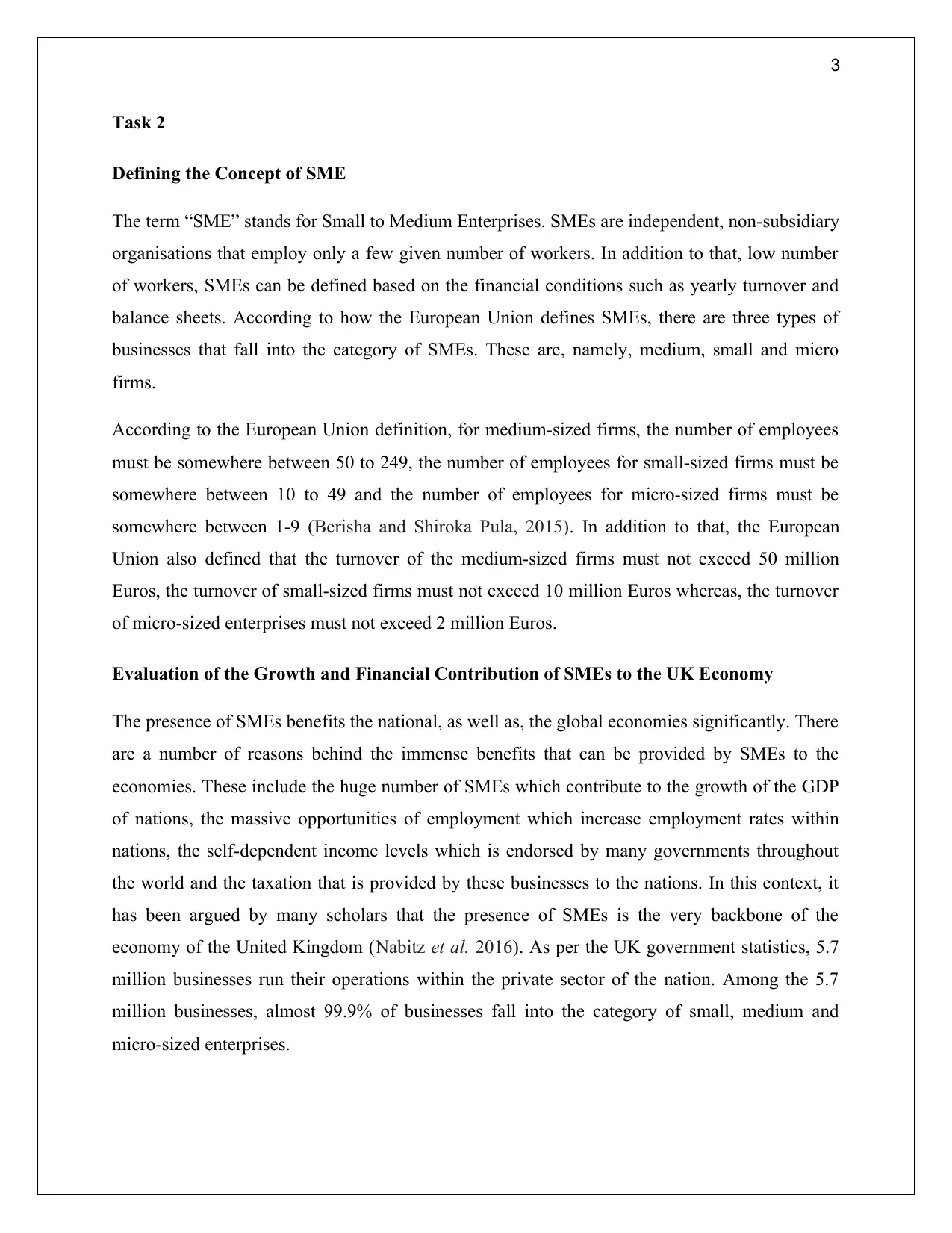
3
Task 2
Defining the Concept of SME
The term “SME” stands for Small to Medium Enterprises. SMEs are independent, non-subsidiary
organisations that employ only a few given number of workers. In addition to that, low number
of workers, SMEs can be defined based on the financial conditions such as yearly turnover and
balance sheets. According to how the European Union defines SMEs, there are three types of
businesses that fall into the category of SMEs. These are, namely, medium, small and micro
firms.
According to the European Union definition, for medium-sized firms, the number of employees
must be somewhere between 50 to 249, the number of employees for small-sized firms must be
somewhere between 10 to 49 and the number of employees for micro-sized firms must be
somewhere between 1-9 (Berisha and Shiroka Pula, 2015). In addition to that, the European
Union also defined that the turnover of the medium-sized firms must not exceed 50 million
Euros, the turnover of small-sized firms must not exceed 10 million Euros whereas, the turnover
of micro-sized enterprises must not exceed 2 million Euros.
Evaluation of the Growth and Financial Contribution of SMEs to the UK Economy
The presence of SMEs benefits the national, as well as, the global economies significantly. There
are a number of reasons behind the immense benefits that can be provided by SMEs to the
economies. These include the huge number of SMEs which contribute to the growth of the GDP
of nations, the massive opportunities of employment which increase employment rates within
nations, the self-dependent income levels which is endorsed by many governments throughout
the world and the taxation that is provided by these businesses to the nations. In this context, it
has been argued by many scholars that the presence of SMEs is the very backbone of the
economy of the United Kingdom (Nabitz et al. 2016). As per the UK government statistics, 5.7
million businesses run their operations within the private sector of the nation. Among the 5.7
million businesses, almost 99.9% of businesses fall into the category of small, medium and
micro-sized enterprises.
Task 2
Defining the Concept of SME
The term “SME” stands for Small to Medium Enterprises. SMEs are independent, non-subsidiary
organisations that employ only a few given number of workers. In addition to that, low number
of workers, SMEs can be defined based on the financial conditions such as yearly turnover and
balance sheets. According to how the European Union defines SMEs, there are three types of
businesses that fall into the category of SMEs. These are, namely, medium, small and micro
firms.
According to the European Union definition, for medium-sized firms, the number of employees
must be somewhere between 50 to 249, the number of employees for small-sized firms must be
somewhere between 10 to 49 and the number of employees for micro-sized firms must be
somewhere between 1-9 (Berisha and Shiroka Pula, 2015). In addition to that, the European
Union also defined that the turnover of the medium-sized firms must not exceed 50 million
Euros, the turnover of small-sized firms must not exceed 10 million Euros whereas, the turnover
of micro-sized enterprises must not exceed 2 million Euros.
Evaluation of the Growth and Financial Contribution of SMEs to the UK Economy
The presence of SMEs benefits the national, as well as, the global economies significantly. There
are a number of reasons behind the immense benefits that can be provided by SMEs to the
economies. These include the huge number of SMEs which contribute to the growth of the GDP
of nations, the massive opportunities of employment which increase employment rates within
nations, the self-dependent income levels which is endorsed by many governments throughout
the world and the taxation that is provided by these businesses to the nations. In this context, it
has been argued by many scholars that the presence of SMEs is the very backbone of the
economy of the United Kingdom (Nabitz et al. 2016). As per the UK government statistics, 5.7
million businesses run their operations within the private sector of the nation. Among the 5.7
million businesses, almost 99.9% of businesses fall into the category of small, medium and
micro-sized enterprises.
⊘ This is a preview!⊘
Do you want full access?
Subscribe today to unlock all pages.

Trusted by 1+ million students worldwide
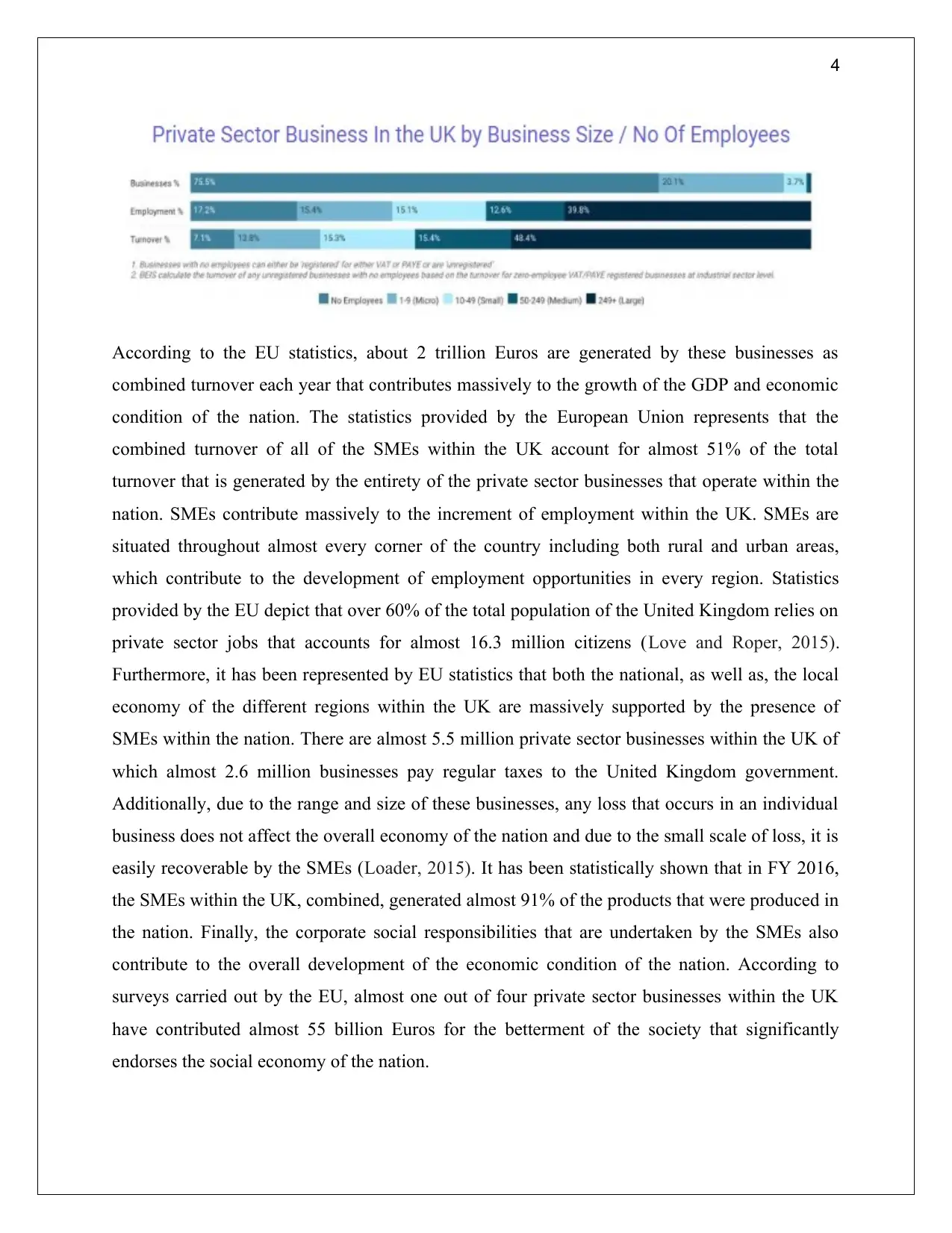
4
According to the EU statistics, about 2 trillion Euros are generated by these businesses as
combined turnover each year that contributes massively to the growth of the GDP and economic
condition of the nation. The statistics provided by the European Union represents that the
combined turnover of all of the SMEs within the UK account for almost 51% of the total
turnover that is generated by the entirety of the private sector businesses that operate within the
nation. SMEs contribute massively to the increment of employment within the UK. SMEs are
situated throughout almost every corner of the country including both rural and urban areas,
which contribute to the development of employment opportunities in every region. Statistics
provided by the EU depict that over 60% of the total population of the United Kingdom relies on
private sector jobs that accounts for almost 16.3 million citizens (Love and Roper, 2015).
Furthermore, it has been represented by EU statistics that both the national, as well as, the local
economy of the different regions within the UK are massively supported by the presence of
SMEs within the nation. There are almost 5.5 million private sector businesses within the UK of
which almost 2.6 million businesses pay regular taxes to the United Kingdom government.
Additionally, due to the range and size of these businesses, any loss that occurs in an individual
business does not affect the overall economy of the nation and due to the small scale of loss, it is
easily recoverable by the SMEs (Loader, 2015). It has been statistically shown that in FY 2016,
the SMEs within the UK, combined, generated almost 91% of the products that were produced in
the nation. Finally, the corporate social responsibilities that are undertaken by the SMEs also
contribute to the overall development of the economic condition of the nation. According to
surveys carried out by the EU, almost one out of four private sector businesses within the UK
have contributed almost 55 billion Euros for the betterment of the society that significantly
endorses the social economy of the nation.
According to the EU statistics, about 2 trillion Euros are generated by these businesses as
combined turnover each year that contributes massively to the growth of the GDP and economic
condition of the nation. The statistics provided by the European Union represents that the
combined turnover of all of the SMEs within the UK account for almost 51% of the total
turnover that is generated by the entirety of the private sector businesses that operate within the
nation. SMEs contribute massively to the increment of employment within the UK. SMEs are
situated throughout almost every corner of the country including both rural and urban areas,
which contribute to the development of employment opportunities in every region. Statistics
provided by the EU depict that over 60% of the total population of the United Kingdom relies on
private sector jobs that accounts for almost 16.3 million citizens (Love and Roper, 2015).
Furthermore, it has been represented by EU statistics that both the national, as well as, the local
economy of the different regions within the UK are massively supported by the presence of
SMEs within the nation. There are almost 5.5 million private sector businesses within the UK of
which almost 2.6 million businesses pay regular taxes to the United Kingdom government.
Additionally, due to the range and size of these businesses, any loss that occurs in an individual
business does not affect the overall economy of the nation and due to the small scale of loss, it is
easily recoverable by the SMEs (Loader, 2015). It has been statistically shown that in FY 2016,
the SMEs within the UK, combined, generated almost 91% of the products that were produced in
the nation. Finally, the corporate social responsibilities that are undertaken by the SMEs also
contribute to the overall development of the economic condition of the nation. According to
surveys carried out by the EU, almost one out of four private sector businesses within the UK
have contributed almost 55 billion Euros for the betterment of the society that significantly
endorses the social economy of the nation.
Paraphrase This Document
Need a fresh take? Get an instant paraphrase of this document with our AI Paraphraser
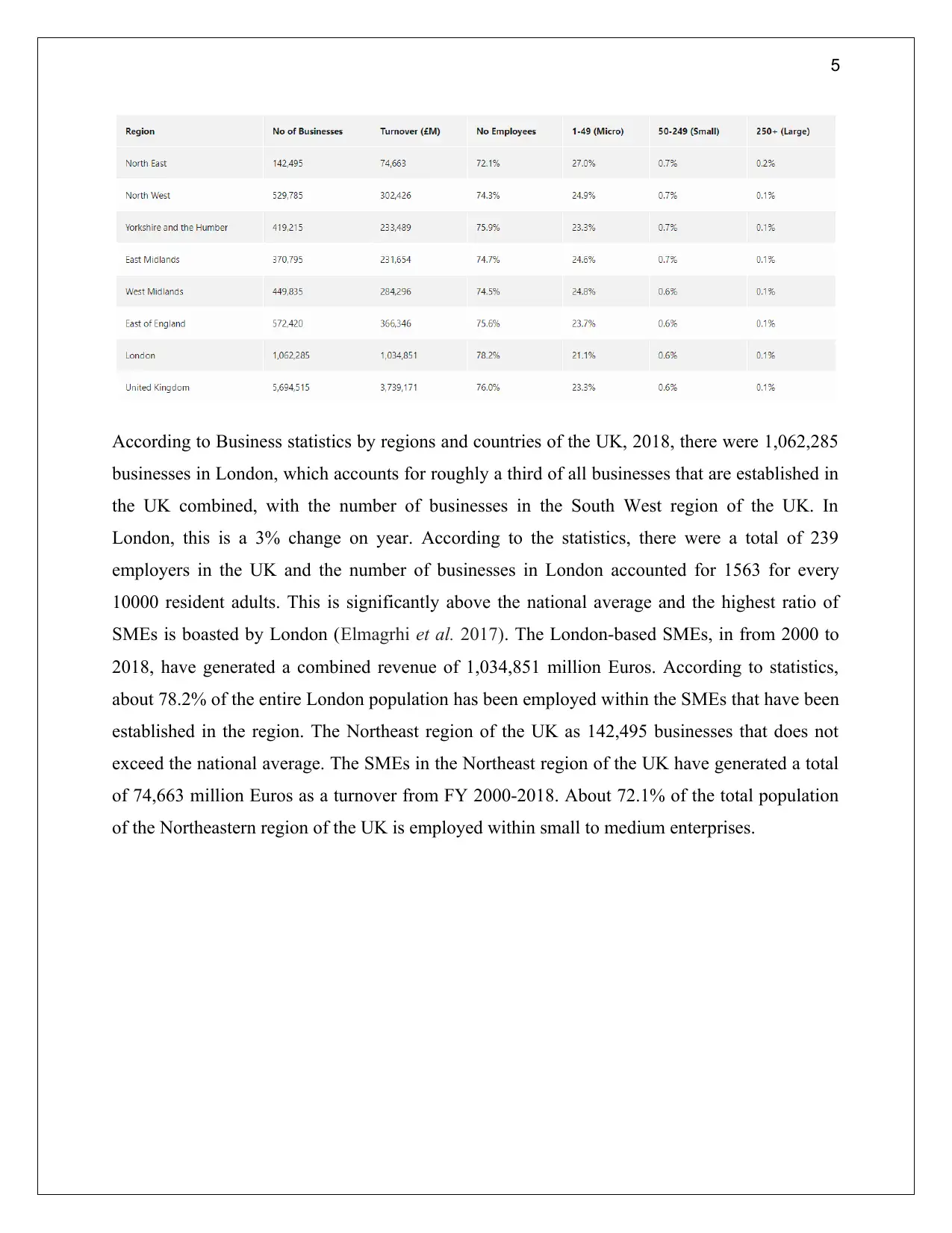
5
According to Business statistics by regions and countries of the UK, 2018, there were 1,062,285
businesses in London, which accounts for roughly a third of all businesses that are established in
the UK combined, with the number of businesses in the South West region of the UK. In
London, this is a 3% change on year. According to the statistics, there were a total of 239
employers in the UK and the number of businesses in London accounted for 1563 for every
10000 resident adults. This is significantly above the national average and the highest ratio of
SMEs is boasted by London (Elmagrhi et al. 2017). The London-based SMEs, in from 2000 to
2018, have generated a combined revenue of 1,034,851 million Euros. According to statistics,
about 78.2% of the entire London population has been employed within the SMEs that have been
established in the region. The Northeast region of the UK as 142,495 businesses that does not
exceed the national average. The SMEs in the Northeast region of the UK have generated a total
of 74,663 million Euros as a turnover from FY 2000-2018. About 72.1% of the total population
of the Northeastern region of the UK is employed within small to medium enterprises.
According to Business statistics by regions and countries of the UK, 2018, there were 1,062,285
businesses in London, which accounts for roughly a third of all businesses that are established in
the UK combined, with the number of businesses in the South West region of the UK. In
London, this is a 3% change on year. According to the statistics, there were a total of 239
employers in the UK and the number of businesses in London accounted for 1563 for every
10000 resident adults. This is significantly above the national average and the highest ratio of
SMEs is boasted by London (Elmagrhi et al. 2017). The London-based SMEs, in from 2000 to
2018, have generated a combined revenue of 1,034,851 million Euros. According to statistics,
about 78.2% of the entire London population has been employed within the SMEs that have been
established in the region. The Northeast region of the UK as 142,495 businesses that does not
exceed the national average. The SMEs in the Northeast region of the UK have generated a total
of 74,663 million Euros as a turnover from FY 2000-2018. About 72.1% of the total population
of the Northeastern region of the UK is employed within small to medium enterprises.
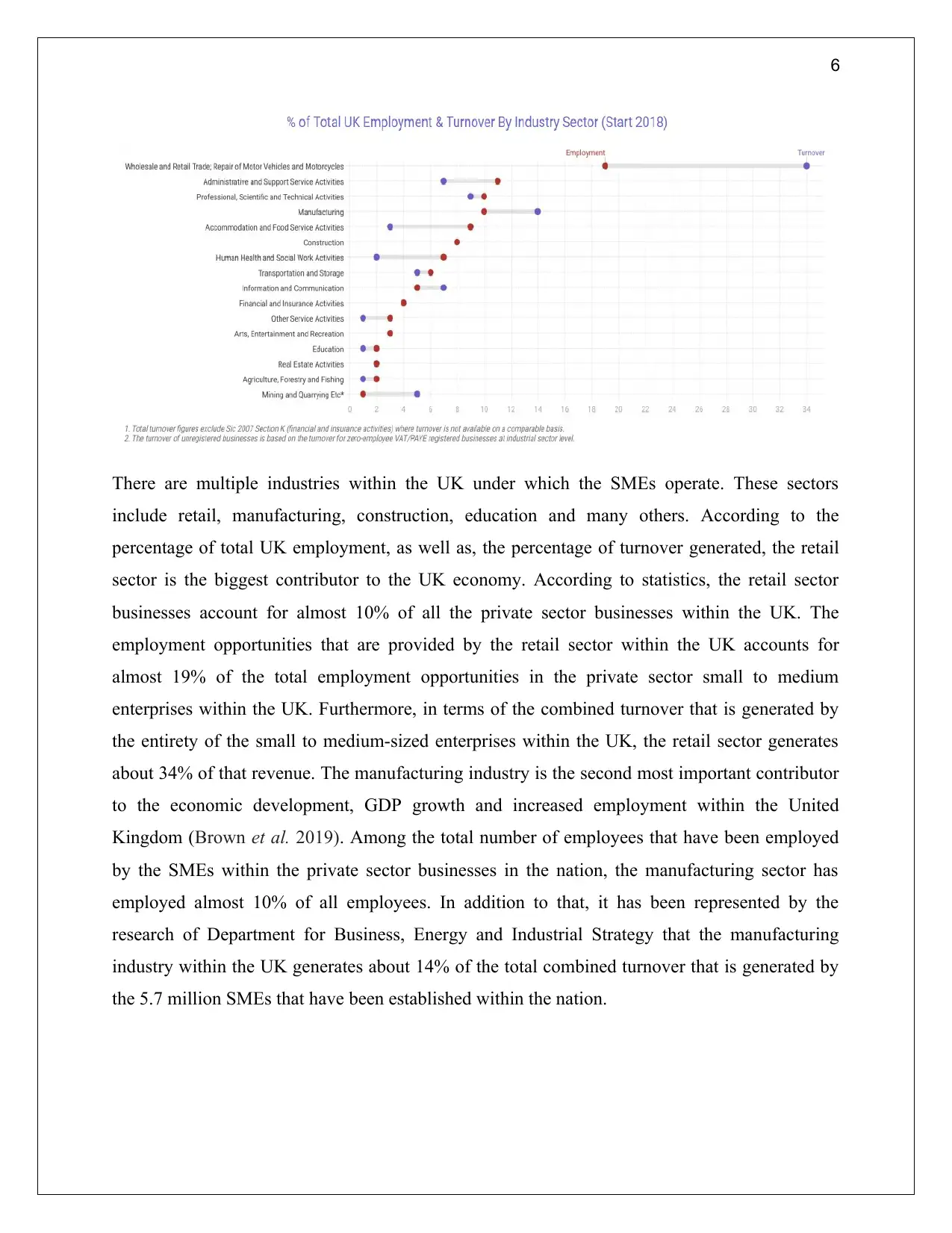
6
There are multiple industries within the UK under which the SMEs operate. These sectors
include retail, manufacturing, construction, education and many others. According to the
percentage of total UK employment, as well as, the percentage of turnover generated, the retail
sector is the biggest contributor to the UK economy. According to statistics, the retail sector
businesses account for almost 10% of all the private sector businesses within the UK. The
employment opportunities that are provided by the retail sector within the UK accounts for
almost 19% of the total employment opportunities in the private sector small to medium
enterprises within the UK. Furthermore, in terms of the combined turnover that is generated by
the entirety of the small to medium-sized enterprises within the UK, the retail sector generates
about 34% of that revenue. The manufacturing industry is the second most important contributor
to the economic development, GDP growth and increased employment within the United
Kingdom (Brown et al. 2019). Among the total number of employees that have been employed
by the SMEs within the private sector businesses in the nation, the manufacturing sector has
employed almost 10% of all employees. In addition to that, it has been represented by the
research of Department for Business, Energy and Industrial Strategy that the manufacturing
industry within the UK generates about 14% of the total combined turnover that is generated by
the 5.7 million SMEs that have been established within the nation.
There are multiple industries within the UK under which the SMEs operate. These sectors
include retail, manufacturing, construction, education and many others. According to the
percentage of total UK employment, as well as, the percentage of turnover generated, the retail
sector is the biggest contributor to the UK economy. According to statistics, the retail sector
businesses account for almost 10% of all the private sector businesses within the UK. The
employment opportunities that are provided by the retail sector within the UK accounts for
almost 19% of the total employment opportunities in the private sector small to medium
enterprises within the UK. Furthermore, in terms of the combined turnover that is generated by
the entirety of the small to medium-sized enterprises within the UK, the retail sector generates
about 34% of that revenue. The manufacturing industry is the second most important contributor
to the economic development, GDP growth and increased employment within the United
Kingdom (Brown et al. 2019). Among the total number of employees that have been employed
by the SMEs within the private sector businesses in the nation, the manufacturing sector has
employed almost 10% of all employees. In addition to that, it has been represented by the
research of Department for Business, Energy and Industrial Strategy that the manufacturing
industry within the UK generates about 14% of the total combined turnover that is generated by
the 5.7 million SMEs that have been established within the nation.
⊘ This is a preview!⊘
Do you want full access?
Subscribe today to unlock all pages.

Trusted by 1+ million students worldwide
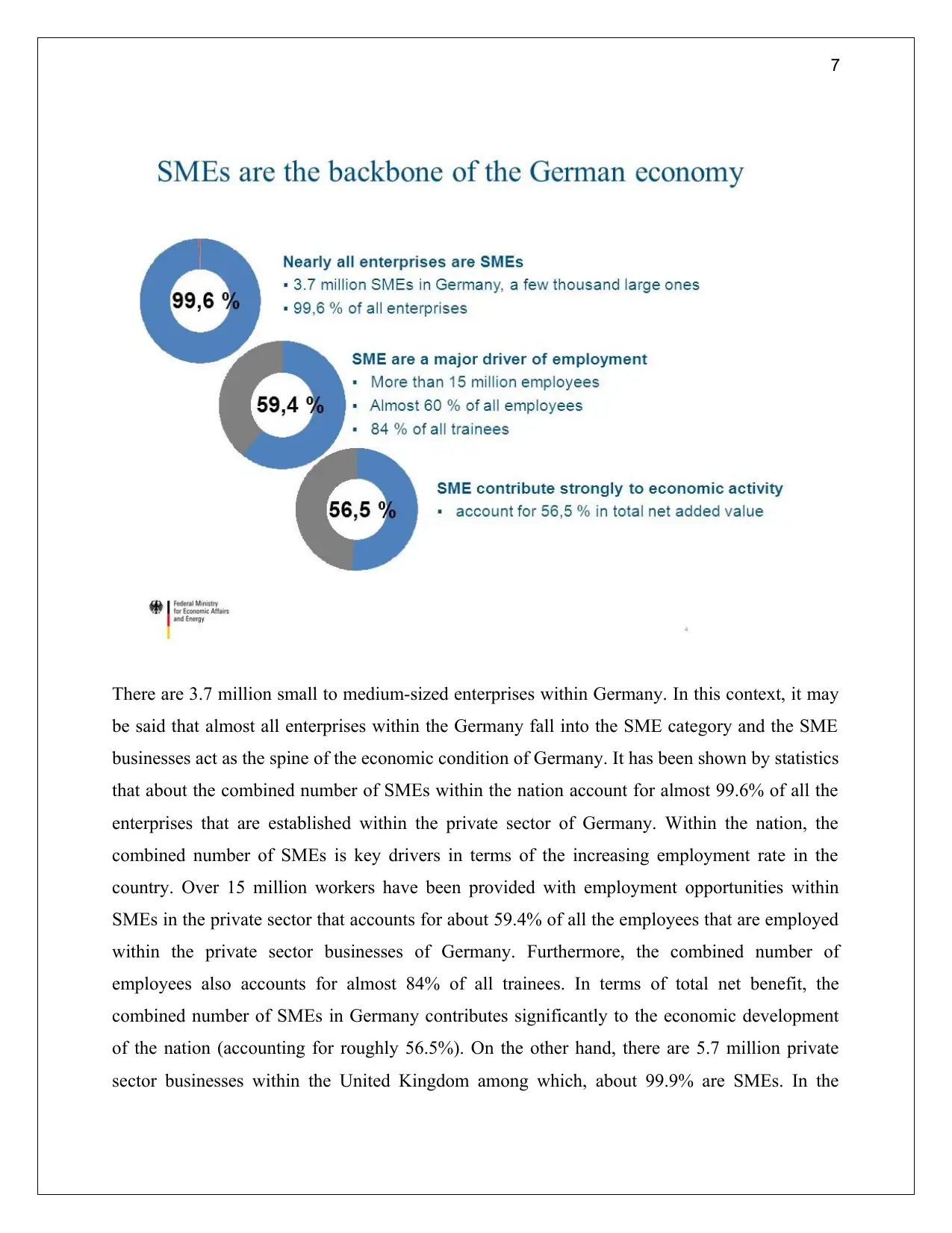
7
There are 3.7 million small to medium-sized enterprises within Germany. In this context, it may
be said that almost all enterprises within the Germany fall into the SME category and the SME
businesses act as the spine of the economic condition of Germany. It has been shown by statistics
that about the combined number of SMEs within the nation account for almost 99.6% of all the
enterprises that are established within the private sector of Germany. Within the nation, the
combined number of SMEs is key drivers in terms of the increasing employment rate in the
country. Over 15 million workers have been provided with employment opportunities within
SMEs in the private sector that accounts for about 59.4% of all the employees that are employed
within the private sector businesses of Germany. Furthermore, the combined number of
employees also accounts for almost 84% of all trainees. In terms of total net benefit, the
combined number of SMEs in Germany contributes significantly to the economic development
of the nation (accounting for roughly 56.5%). On the other hand, there are 5.7 million private
sector businesses within the United Kingdom among which, about 99.9% are SMEs. In the
There are 3.7 million small to medium-sized enterprises within Germany. In this context, it may
be said that almost all enterprises within the Germany fall into the SME category and the SME
businesses act as the spine of the economic condition of Germany. It has been shown by statistics
that about the combined number of SMEs within the nation account for almost 99.6% of all the
enterprises that are established within the private sector of Germany. Within the nation, the
combined number of SMEs is key drivers in terms of the increasing employment rate in the
country. Over 15 million workers have been provided with employment opportunities within
SMEs in the private sector that accounts for about 59.4% of all the employees that are employed
within the private sector businesses of Germany. Furthermore, the combined number of
employees also accounts for almost 84% of all trainees. In terms of total net benefit, the
combined number of SMEs in Germany contributes significantly to the economic development
of the nation (accounting for roughly 56.5%). On the other hand, there are 5.7 million private
sector businesses within the United Kingdom among which, about 99.9% are SMEs. In the
Paraphrase This Document
Need a fresh take? Get an instant paraphrase of this document with our AI Paraphraser
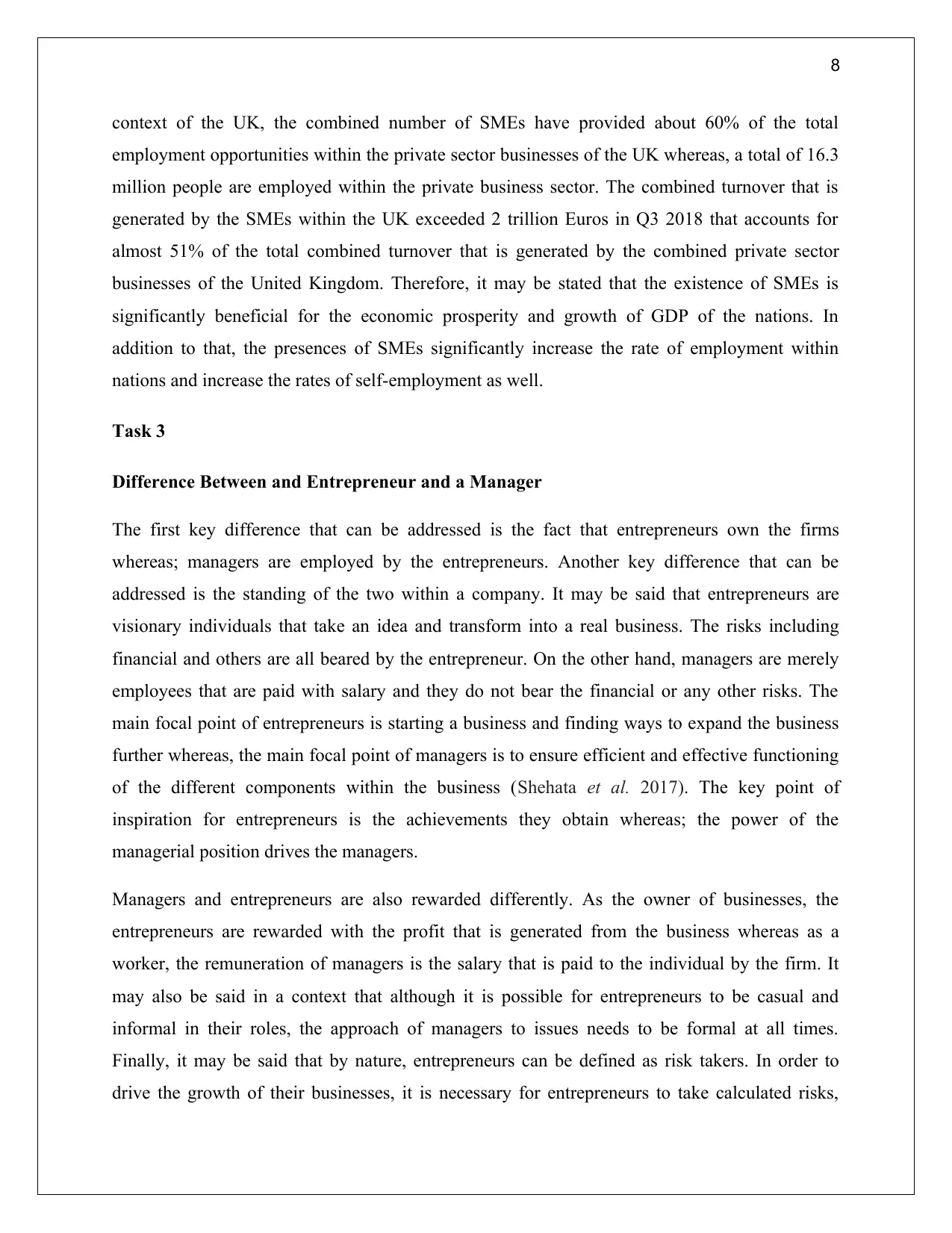
8
context of the UK, the combined number of SMEs have provided about 60% of the total
employment opportunities within the private sector businesses of the UK whereas, a total of 16.3
million people are employed within the private business sector. The combined turnover that is
generated by the SMEs within the UK exceeded 2 trillion Euros in Q3 2018 that accounts for
almost 51% of the total combined turnover that is generated by the combined private sector
businesses of the United Kingdom. Therefore, it may be stated that the existence of SMEs is
significantly beneficial for the economic prosperity and growth of GDP of the nations. In
addition to that, the presences of SMEs significantly increase the rate of employment within
nations and increase the rates of self-employment as well.
Task 3
Difference Between and Entrepreneur and a Manager
The first key difference that can be addressed is the fact that entrepreneurs own the firms
whereas; managers are employed by the entrepreneurs. Another key difference that can be
addressed is the standing of the two within a company. It may be said that entrepreneurs are
visionary individuals that take an idea and transform into a real business. The risks including
financial and others are all beared by the entrepreneur. On the other hand, managers are merely
employees that are paid with salary and they do not bear the financial or any other risks. The
main focal point of entrepreneurs is starting a business and finding ways to expand the business
further whereas, the main focal point of managers is to ensure efficient and effective functioning
of the different components within the business (Shehata et al. 2017). The key point of
inspiration for entrepreneurs is the achievements they obtain whereas; the power of the
managerial position drives the managers.
Managers and entrepreneurs are also rewarded differently. As the owner of businesses, the
entrepreneurs are rewarded with the profit that is generated from the business whereas as a
worker, the remuneration of managers is the salary that is paid to the individual by the firm. It
may also be said in a context that although it is possible for entrepreneurs to be casual and
informal in their roles, the approach of managers to issues needs to be formal at all times.
Finally, it may be said that by nature, entrepreneurs can be defined as risk takers. In order to
drive the growth of their businesses, it is necessary for entrepreneurs to take calculated risks,
context of the UK, the combined number of SMEs have provided about 60% of the total
employment opportunities within the private sector businesses of the UK whereas, a total of 16.3
million people are employed within the private business sector. The combined turnover that is
generated by the SMEs within the UK exceeded 2 trillion Euros in Q3 2018 that accounts for
almost 51% of the total combined turnover that is generated by the combined private sector
businesses of the United Kingdom. Therefore, it may be stated that the existence of SMEs is
significantly beneficial for the economic prosperity and growth of GDP of the nations. In
addition to that, the presences of SMEs significantly increase the rate of employment within
nations and increase the rates of self-employment as well.
Task 3
Difference Between and Entrepreneur and a Manager
The first key difference that can be addressed is the fact that entrepreneurs own the firms
whereas; managers are employed by the entrepreneurs. Another key difference that can be
addressed is the standing of the two within a company. It may be said that entrepreneurs are
visionary individuals that take an idea and transform into a real business. The risks including
financial and others are all beared by the entrepreneur. On the other hand, managers are merely
employees that are paid with salary and they do not bear the financial or any other risks. The
main focal point of entrepreneurs is starting a business and finding ways to expand the business
further whereas, the main focal point of managers is to ensure efficient and effective functioning
of the different components within the business (Shehata et al. 2017). The key point of
inspiration for entrepreneurs is the achievements they obtain whereas; the power of the
managerial position drives the managers.
Managers and entrepreneurs are also rewarded differently. As the owner of businesses, the
entrepreneurs are rewarded with the profit that is generated from the business whereas as a
worker, the remuneration of managers is the salary that is paid to the individual by the firm. It
may also be said in a context that although it is possible for entrepreneurs to be casual and
informal in their roles, the approach of managers to issues needs to be formal at all times.
Finally, it may be said that by nature, entrepreneurs can be defined as risk takers. In order to
drive the growth of their businesses, it is necessary for entrepreneurs to take calculated risks,
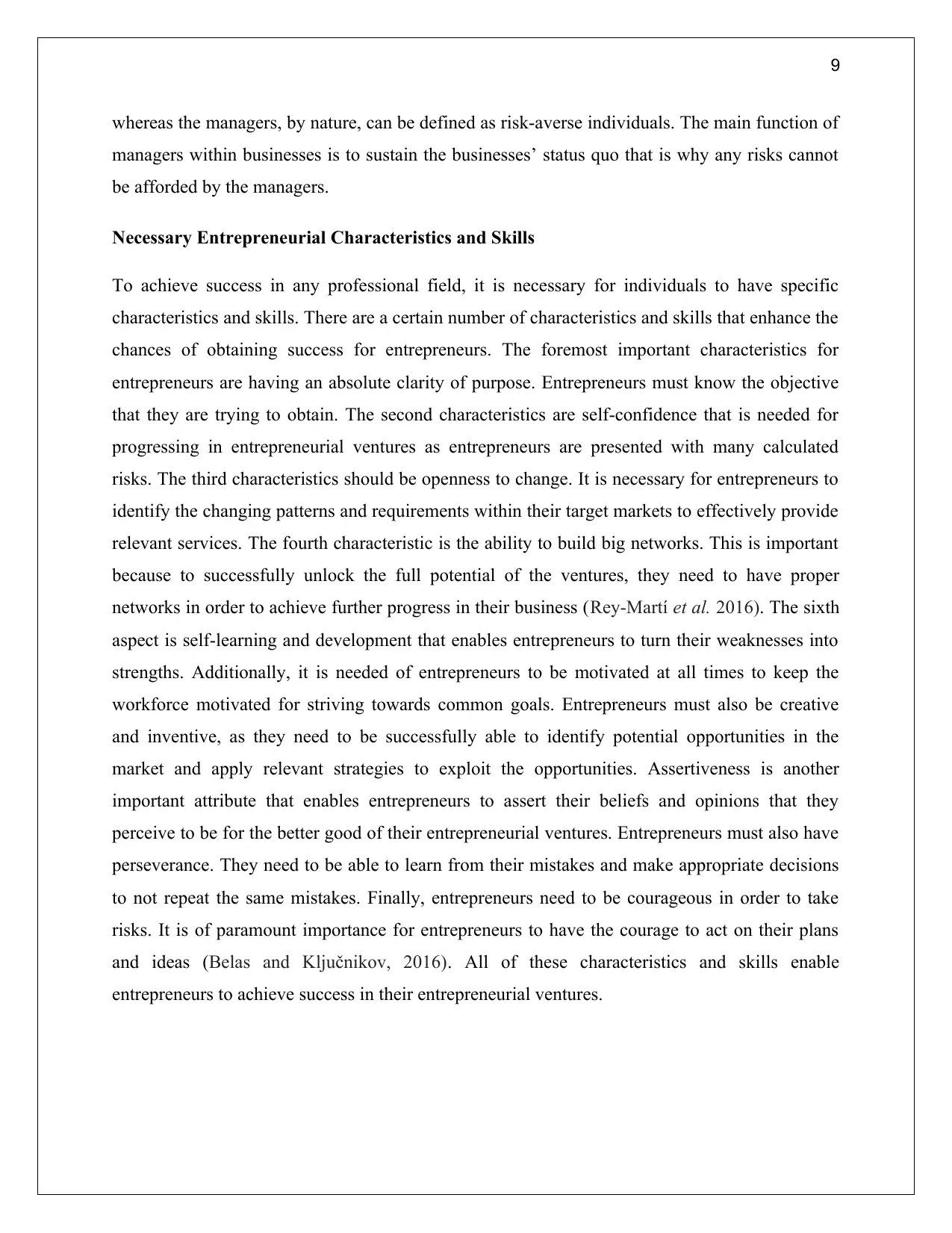
9
whereas the managers, by nature, can be defined as risk-averse individuals. The main function of
managers within businesses is to sustain the businesses’ status quo that is why any risks cannot
be afforded by the managers.
Necessary Entrepreneurial Characteristics and Skills
To achieve success in any professional field, it is necessary for individuals to have specific
characteristics and skills. There are a certain number of characteristics and skills that enhance the
chances of obtaining success for entrepreneurs. The foremost important characteristics for
entrepreneurs are having an absolute clarity of purpose. Entrepreneurs must know the objective
that they are trying to obtain. The second characteristics are self-confidence that is needed for
progressing in entrepreneurial ventures as entrepreneurs are presented with many calculated
risks. The third characteristics should be openness to change. It is necessary for entrepreneurs to
identify the changing patterns and requirements within their target markets to effectively provide
relevant services. The fourth characteristic is the ability to build big networks. This is important
because to successfully unlock the full potential of the ventures, they need to have proper
networks in order to achieve further progress in their business (Rey-Martí et al. 2016). The sixth
aspect is self-learning and development that enables entrepreneurs to turn their weaknesses into
strengths. Additionally, it is needed of entrepreneurs to be motivated at all times to keep the
workforce motivated for striving towards common goals. Entrepreneurs must also be creative
and inventive, as they need to be successfully able to identify potential opportunities in the
market and apply relevant strategies to exploit the opportunities. Assertiveness is another
important attribute that enables entrepreneurs to assert their beliefs and opinions that they
perceive to be for the better good of their entrepreneurial ventures. Entrepreneurs must also have
perseverance. They need to be able to learn from their mistakes and make appropriate decisions
to not repeat the same mistakes. Finally, entrepreneurs need to be courageous in order to take
risks. It is of paramount importance for entrepreneurs to have the courage to act on their plans
and ideas (Belas and Ključnikov, 2016). All of these characteristics and skills enable
entrepreneurs to achieve success in their entrepreneurial ventures.
whereas the managers, by nature, can be defined as risk-averse individuals. The main function of
managers within businesses is to sustain the businesses’ status quo that is why any risks cannot
be afforded by the managers.
Necessary Entrepreneurial Characteristics and Skills
To achieve success in any professional field, it is necessary for individuals to have specific
characteristics and skills. There are a certain number of characteristics and skills that enhance the
chances of obtaining success for entrepreneurs. The foremost important characteristics for
entrepreneurs are having an absolute clarity of purpose. Entrepreneurs must know the objective
that they are trying to obtain. The second characteristics are self-confidence that is needed for
progressing in entrepreneurial ventures as entrepreneurs are presented with many calculated
risks. The third characteristics should be openness to change. It is necessary for entrepreneurs to
identify the changing patterns and requirements within their target markets to effectively provide
relevant services. The fourth characteristic is the ability to build big networks. This is important
because to successfully unlock the full potential of the ventures, they need to have proper
networks in order to achieve further progress in their business (Rey-Martí et al. 2016). The sixth
aspect is self-learning and development that enables entrepreneurs to turn their weaknesses into
strengths. Additionally, it is needed of entrepreneurs to be motivated at all times to keep the
workforce motivated for striving towards common goals. Entrepreneurs must also be creative
and inventive, as they need to be successfully able to identify potential opportunities in the
market and apply relevant strategies to exploit the opportunities. Assertiveness is another
important attribute that enables entrepreneurs to assert their beliefs and opinions that they
perceive to be for the better good of their entrepreneurial ventures. Entrepreneurs must also have
perseverance. They need to be able to learn from their mistakes and make appropriate decisions
to not repeat the same mistakes. Finally, entrepreneurs need to be courageous in order to take
risks. It is of paramount importance for entrepreneurs to have the courage to act on their plans
and ideas (Belas and Ključnikov, 2016). All of these characteristics and skills enable
entrepreneurs to achieve success in their entrepreneurial ventures.
⊘ This is a preview!⊘
Do you want full access?
Subscribe today to unlock all pages.

Trusted by 1+ million students worldwide
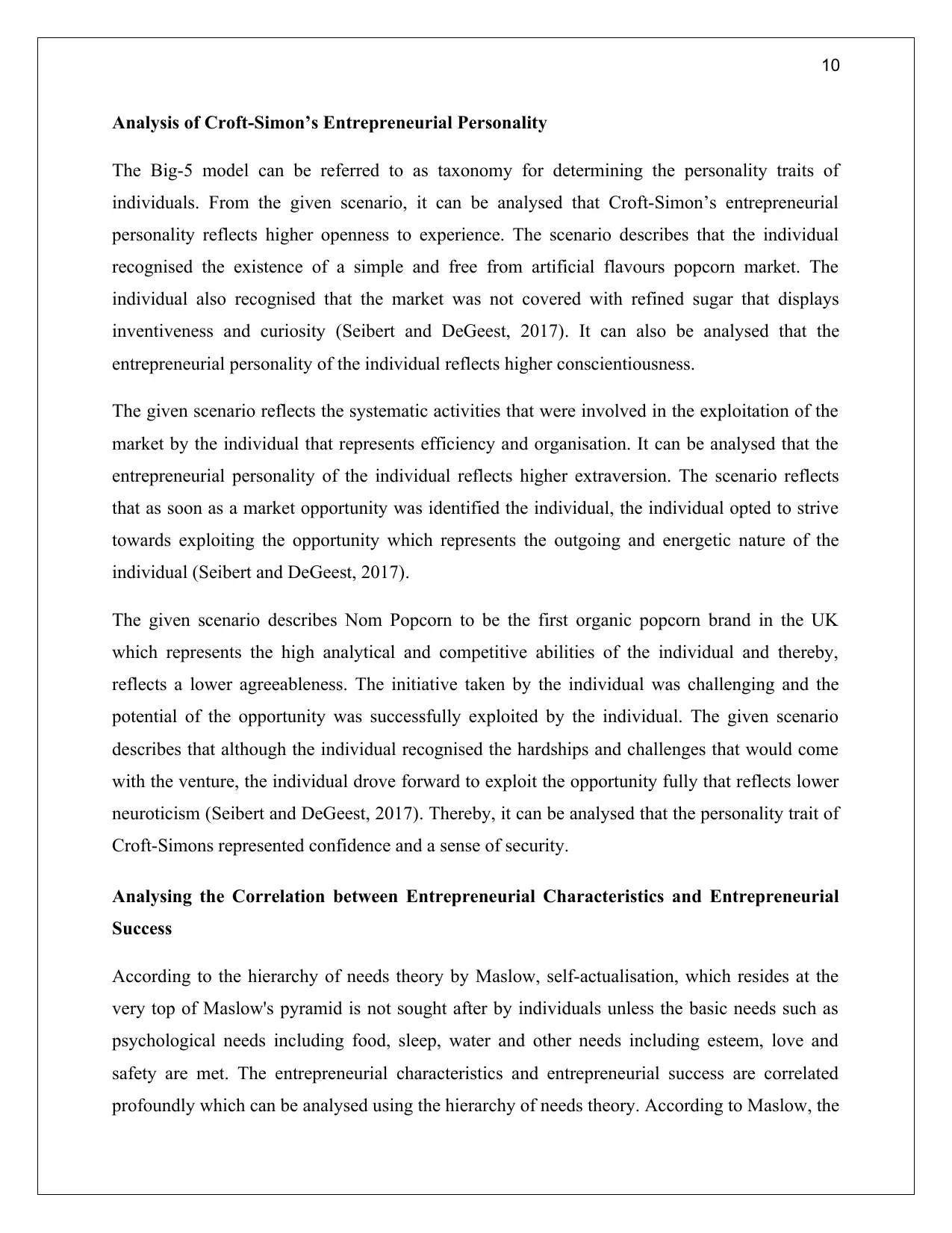
10
Analysis of Croft-Simon’s Entrepreneurial Personality
The Big-5 model can be referred to as taxonomy for determining the personality traits of
individuals. From the given scenario, it can be analysed that Croft-Simon’s entrepreneurial
personality reflects higher openness to experience. The scenario describes that the individual
recognised the existence of a simple and free from artificial flavours popcorn market. The
individual also recognised that the market was not covered with refined sugar that displays
inventiveness and curiosity (Seibert and DeGeest, 2017). It can also be analysed that the
entrepreneurial personality of the individual reflects higher conscientiousness.
The given scenario reflects the systematic activities that were involved in the exploitation of the
market by the individual that represents efficiency and organisation. It can be analysed that the
entrepreneurial personality of the individual reflects higher extraversion. The scenario reflects
that as soon as a market opportunity was identified the individual, the individual opted to strive
towards exploiting the opportunity which represents the outgoing and energetic nature of the
individual (Seibert and DeGeest, 2017).
The given scenario describes Nom Popcorn to be the first organic popcorn brand in the UK
which represents the high analytical and competitive abilities of the individual and thereby,
reflects a lower agreeableness. The initiative taken by the individual was challenging and the
potential of the opportunity was successfully exploited by the individual. The given scenario
describes that although the individual recognised the hardships and challenges that would come
with the venture, the individual drove forward to exploit the opportunity fully that reflects lower
neuroticism (Seibert and DeGeest, 2017). Thereby, it can be analysed that the personality trait of
Croft-Simons represented confidence and a sense of security.
Analysing the Correlation between Entrepreneurial Characteristics and Entrepreneurial
Success
According to the hierarchy of needs theory by Maslow, self-actualisation, which resides at the
very top of Maslow's pyramid is not sought after by individuals unless the basic needs such as
psychological needs including food, sleep, water and other needs including esteem, love and
safety are met. The entrepreneurial characteristics and entrepreneurial success are correlated
profoundly which can be analysed using the hierarchy of needs theory. According to Maslow, the
Analysis of Croft-Simon’s Entrepreneurial Personality
The Big-5 model can be referred to as taxonomy for determining the personality traits of
individuals. From the given scenario, it can be analysed that Croft-Simon’s entrepreneurial
personality reflects higher openness to experience. The scenario describes that the individual
recognised the existence of a simple and free from artificial flavours popcorn market. The
individual also recognised that the market was not covered with refined sugar that displays
inventiveness and curiosity (Seibert and DeGeest, 2017). It can also be analysed that the
entrepreneurial personality of the individual reflects higher conscientiousness.
The given scenario reflects the systematic activities that were involved in the exploitation of the
market by the individual that represents efficiency and organisation. It can be analysed that the
entrepreneurial personality of the individual reflects higher extraversion. The scenario reflects
that as soon as a market opportunity was identified the individual, the individual opted to strive
towards exploiting the opportunity which represents the outgoing and energetic nature of the
individual (Seibert and DeGeest, 2017).
The given scenario describes Nom Popcorn to be the first organic popcorn brand in the UK
which represents the high analytical and competitive abilities of the individual and thereby,
reflects a lower agreeableness. The initiative taken by the individual was challenging and the
potential of the opportunity was successfully exploited by the individual. The given scenario
describes that although the individual recognised the hardships and challenges that would come
with the venture, the individual drove forward to exploit the opportunity fully that reflects lower
neuroticism (Seibert and DeGeest, 2017). Thereby, it can be analysed that the personality trait of
Croft-Simons represented confidence and a sense of security.
Analysing the Correlation between Entrepreneurial Characteristics and Entrepreneurial
Success
According to the hierarchy of needs theory by Maslow, self-actualisation, which resides at the
very top of Maslow's pyramid is not sought after by individuals unless the basic needs such as
psychological needs including food, sleep, water and other needs including esteem, love and
safety are met. The entrepreneurial characteristics and entrepreneurial success are correlated
profoundly which can be analysed using the hierarchy of needs theory. According to Maslow, the
Paraphrase This Document
Need a fresh take? Get an instant paraphrase of this document with our AI Paraphraser

11
hierarchy of needs is a theory that facilitates the comprehension of what factors or conditions
influence or motivate individuals to drive forward to achieve self-actualisation.
The first factor that determines an entrepreneurial mindset is being paid for something that an
individual has created which can be attributed to the psychological needs of the individuals. The
first step of entrepreneurship is creating a business that offers any kind of value to the users that
being paid in exchange of providing the service. Being paid in exchange for the service fulfils
the first criteria of the pyramid, which is the psychological needs of individuals, and after
successfully meeting the first criteria, the second phase of the pyramid can be achieved
(Carayannis and Harvard, 2016). The phase two of Maslow’s pyramid is safety. Whereas the first
phase associates with getting paid in exchange of the provided services, the second phase is
associated with developing business processes that support the business and the income that is
generated from the business. In order to achieve a sense of safety, it is necessary for individuals
to achieve a sustainable income, which can be generated from a sustainable business.
Once the sense of safety has been fulfilled, the third phase can be achieved which associates with
love and belonging. In this phase, entrepreneurs create sustainable and great business
relationships with people that have shared convictions and values. Being surrounded by people
with similar mindsets can facilitate the achievement of a sense of belonging within the
enterprise. The fourth phase is esteem or achieving excellence in business. Once individuals have
achieved the sense of belonging, individuals tend to look at their businesses from an extrinsic
perspective (Nkurunziza, 2016). In this phase, entrepreneurs seek external validation which may
come in a number of forms including recognition by peers, achieved awards and
acknowledgement that one has established something special. This phase enables individuals to
achieve a sense of recognition and develops confidence.
Once all of these phases have been successfully met, entrepreneurs are led towards the final stage
that is purpose and legacy, or, in other words, self-actualisation. In this phase, the purpose of the
entrepreneurial ventures is questioned by the individuals themselves. The entrepreneurs strive to
find further purposes and seek for ways to enhance the impact of their business. Thereby, it may
be said that the entrepreneurial attributes, which are represented by the basic phases of needs
within Maslow’s pyramid, are significantly correlated with achieving entrepreneurial success as
hierarchy of needs is a theory that facilitates the comprehension of what factors or conditions
influence or motivate individuals to drive forward to achieve self-actualisation.
The first factor that determines an entrepreneurial mindset is being paid for something that an
individual has created which can be attributed to the psychological needs of the individuals. The
first step of entrepreneurship is creating a business that offers any kind of value to the users that
being paid in exchange of providing the service. Being paid in exchange for the service fulfils
the first criteria of the pyramid, which is the psychological needs of individuals, and after
successfully meeting the first criteria, the second phase of the pyramid can be achieved
(Carayannis and Harvard, 2016). The phase two of Maslow’s pyramid is safety. Whereas the first
phase associates with getting paid in exchange of the provided services, the second phase is
associated with developing business processes that support the business and the income that is
generated from the business. In order to achieve a sense of safety, it is necessary for individuals
to achieve a sustainable income, which can be generated from a sustainable business.
Once the sense of safety has been fulfilled, the third phase can be achieved which associates with
love and belonging. In this phase, entrepreneurs create sustainable and great business
relationships with people that have shared convictions and values. Being surrounded by people
with similar mindsets can facilitate the achievement of a sense of belonging within the
enterprise. The fourth phase is esteem or achieving excellence in business. Once individuals have
achieved the sense of belonging, individuals tend to look at their businesses from an extrinsic
perspective (Nkurunziza, 2016). In this phase, entrepreneurs seek external validation which may
come in a number of forms including recognition by peers, achieved awards and
acknowledgement that one has established something special. This phase enables individuals to
achieve a sense of recognition and develops confidence.
Once all of these phases have been successfully met, entrepreneurs are led towards the final stage
that is purpose and legacy, or, in other words, self-actualisation. In this phase, the purpose of the
entrepreneurial ventures is questioned by the individuals themselves. The entrepreneurs strive to
find further purposes and seek for ways to enhance the impact of their business. Thereby, it may
be said that the entrepreneurial attributes, which are represented by the basic phases of needs
within Maslow’s pyramid, are significantly correlated with achieving entrepreneurial success as
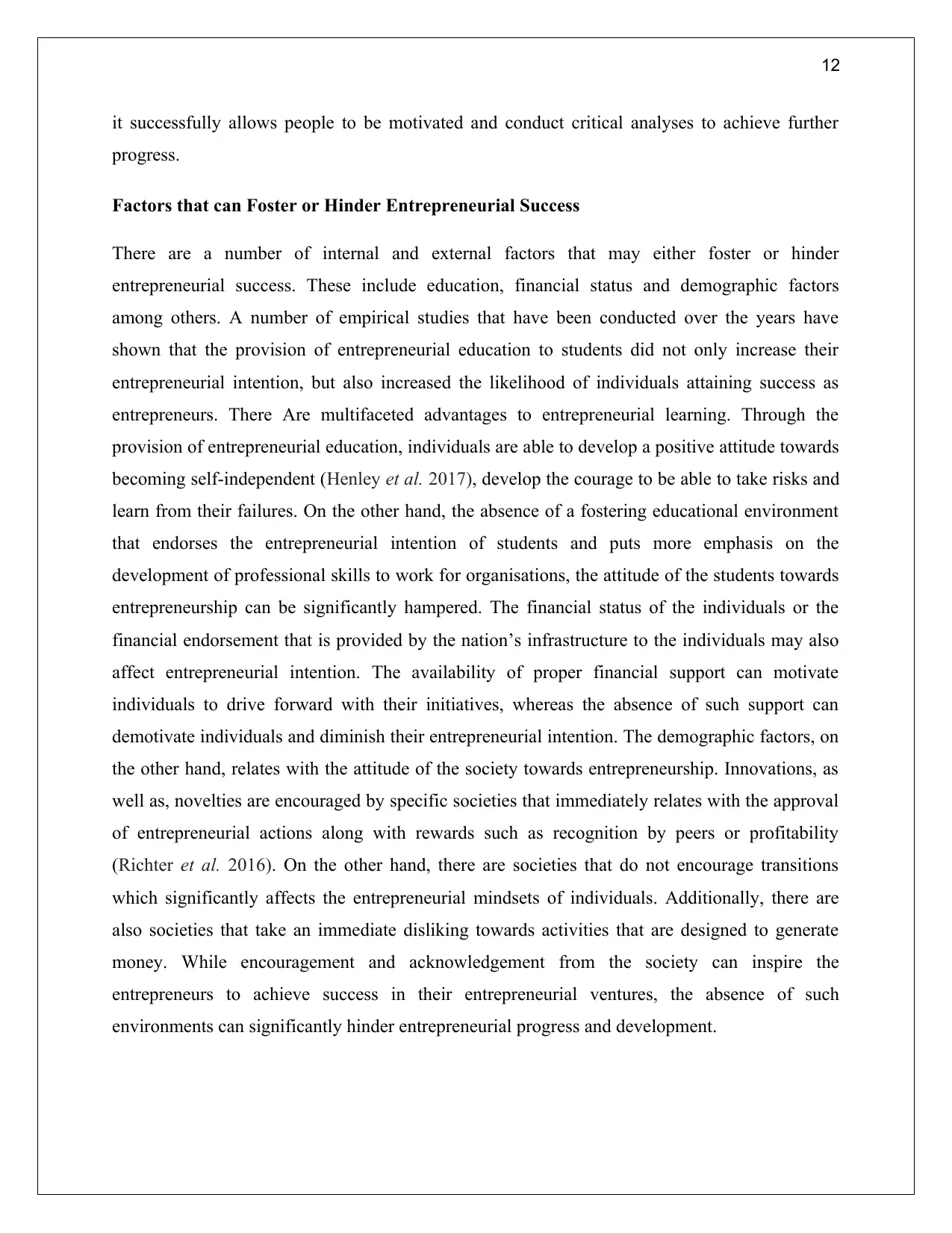
12
it successfully allows people to be motivated and conduct critical analyses to achieve further
progress.
Factors that can Foster or Hinder Entrepreneurial Success
There are a number of internal and external factors that may either foster or hinder
entrepreneurial success. These include education, financial status and demographic factors
among others. A number of empirical studies that have been conducted over the years have
shown that the provision of entrepreneurial education to students did not only increase their
entrepreneurial intention, but also increased the likelihood of individuals attaining success as
entrepreneurs. There Are multifaceted advantages to entrepreneurial learning. Through the
provision of entrepreneurial education, individuals are able to develop a positive attitude towards
becoming self-independent (Henley et al. 2017), develop the courage to be able to take risks and
learn from their failures. On the other hand, the absence of a fostering educational environment
that endorses the entrepreneurial intention of students and puts more emphasis on the
development of professional skills to work for organisations, the attitude of the students towards
entrepreneurship can be significantly hampered. The financial status of the individuals or the
financial endorsement that is provided by the nation’s infrastructure to the individuals may also
affect entrepreneurial intention. The availability of proper financial support can motivate
individuals to drive forward with their initiatives, whereas the absence of such support can
demotivate individuals and diminish their entrepreneurial intention. The demographic factors, on
the other hand, relates with the attitude of the society towards entrepreneurship. Innovations, as
well as, novelties are encouraged by specific societies that immediately relates with the approval
of entrepreneurial actions along with rewards such as recognition by peers or profitability
(Richter et al. 2016). On the other hand, there are societies that do not encourage transitions
which significantly affects the entrepreneurial mindsets of individuals. Additionally, there are
also societies that take an immediate disliking towards activities that are designed to generate
money. While encouragement and acknowledgement from the society can inspire the
entrepreneurs to achieve success in their entrepreneurial ventures, the absence of such
environments can significantly hinder entrepreneurial progress and development.
it successfully allows people to be motivated and conduct critical analyses to achieve further
progress.
Factors that can Foster or Hinder Entrepreneurial Success
There are a number of internal and external factors that may either foster or hinder
entrepreneurial success. These include education, financial status and demographic factors
among others. A number of empirical studies that have been conducted over the years have
shown that the provision of entrepreneurial education to students did not only increase their
entrepreneurial intention, but also increased the likelihood of individuals attaining success as
entrepreneurs. There Are multifaceted advantages to entrepreneurial learning. Through the
provision of entrepreneurial education, individuals are able to develop a positive attitude towards
becoming self-independent (Henley et al. 2017), develop the courage to be able to take risks and
learn from their failures. On the other hand, the absence of a fostering educational environment
that endorses the entrepreneurial intention of students and puts more emphasis on the
development of professional skills to work for organisations, the attitude of the students towards
entrepreneurship can be significantly hampered. The financial status of the individuals or the
financial endorsement that is provided by the nation’s infrastructure to the individuals may also
affect entrepreneurial intention. The availability of proper financial support can motivate
individuals to drive forward with their initiatives, whereas the absence of such support can
demotivate individuals and diminish their entrepreneurial intention. The demographic factors, on
the other hand, relates with the attitude of the society towards entrepreneurship. Innovations, as
well as, novelties are encouraged by specific societies that immediately relates with the approval
of entrepreneurial actions along with rewards such as recognition by peers or profitability
(Richter et al. 2016). On the other hand, there are societies that do not encourage transitions
which significantly affects the entrepreneurial mindsets of individuals. Additionally, there are
also societies that take an immediate disliking towards activities that are designed to generate
money. While encouragement and acknowledgement from the society can inspire the
entrepreneurs to achieve success in their entrepreneurial ventures, the absence of such
environments can significantly hinder entrepreneurial progress and development.
⊘ This is a preview!⊘
Do you want full access?
Subscribe today to unlock all pages.

Trusted by 1+ million students worldwide
1 out of 15
Related Documents
Your All-in-One AI-Powered Toolkit for Academic Success.
+13062052269
info@desklib.com
Available 24*7 on WhatsApp / Email
![[object Object]](/_next/static/media/star-bottom.7253800d.svg)
Unlock your academic potential
Copyright © 2020–2026 A2Z Services. All Rights Reserved. Developed and managed by ZUCOL.



